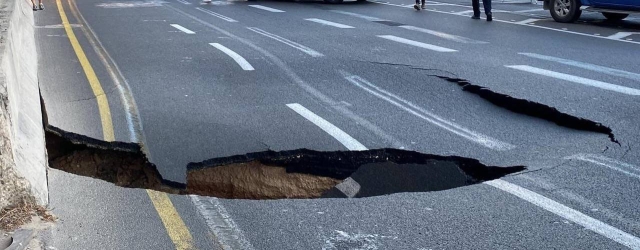A large sinkhole was exposed over the weekend in the southbound Ayalon lanes, Tel Aviv’s main inner city highway. The sinkhole was possibly created due to construction work for a new building that will be part of the Azrieli Towers. Ayalon Routes announced later that they have closed the large sinkhole that opened near the Azrieli Towers, and estimated that the exit to the Shalom Interchange, is expected to open within 48 hours.
Following the discovery of the sinkhole on one of the most popular roads in Israel, The Ayalon lanes were blocked for about an hour during the night between Saturday and Sunday from the Halacha Interchange to the Shalom Interchange, for the purpose of checking for the presence of additional sinkholes. Early Sunday morning, the VP of Ayalon Routes, Ofer Cohen-Kalf, estimated that: "We can say with certainty that the area is quite safe from sinkholes."
After extensive inspections in the area of the sinkhole and with the advice of local experts, train traffic in Tel Aviv resumed and the Southern Ayalon route was opened to traffic, but the crossing at the Shalom Interchange will remain closed, at least for time being. According to Waze data, in the aftermath of the sinkhole, heavy traffic was created on Sunday morning, which is the first day of the workweek in Israel.
After an hour and a half of pouring concrete, the sinkhole on Ayalon highway in Tel Aviv has been countered up. The sinkhole opened up earlier today causing massive traffic delays today and for tomorrow. The sinkhole was 15 meters deep. pic.twitter.com/TtNnG9fobE
— Chaim • حاييم • חיים (@ChaimSmierc) September 17, 2022
In the early hours of the morning between Saturday and Sunday the transportation minister, Meirav Michaeli visited the site of the sinkhole and recommended those entering Tel Aviv to do so by public transportation.
Prof. Shmuel Marko, a geologist from the Department of Geophysics at Tel Aviv University, explained that the sinkhole created in the Ayalon lanes was most likely due to a technical failure of the contractors who are building the Azrieli Spiral adjacent to where the hole appeared: "In this case, I have no doubt that it is a man-made technical failure. There is nothing natural there that could cause a sinkhole."
Construction site of the Azrieli Spiral Tower next to the Ayalon sinkhole.
— Thomas Schlijper (@schlijperisrael) September 17, 2022
17.09.2022 19:57 #TelAviv #sinkhole pic.twitter.com/0uzojnJskx
"I don't want to blame anyone, but it happened on a ramp," Prof. Marko noted. "The infrastructure there is artificial. To build the ramp, they filled in material and paved the road over it. So either they didn't tighten it enough or they tightened it too much and a pipe exploded and a space was created under the road. Until the road collapsed, this pit was formed. It's not a natural sinkhole."


